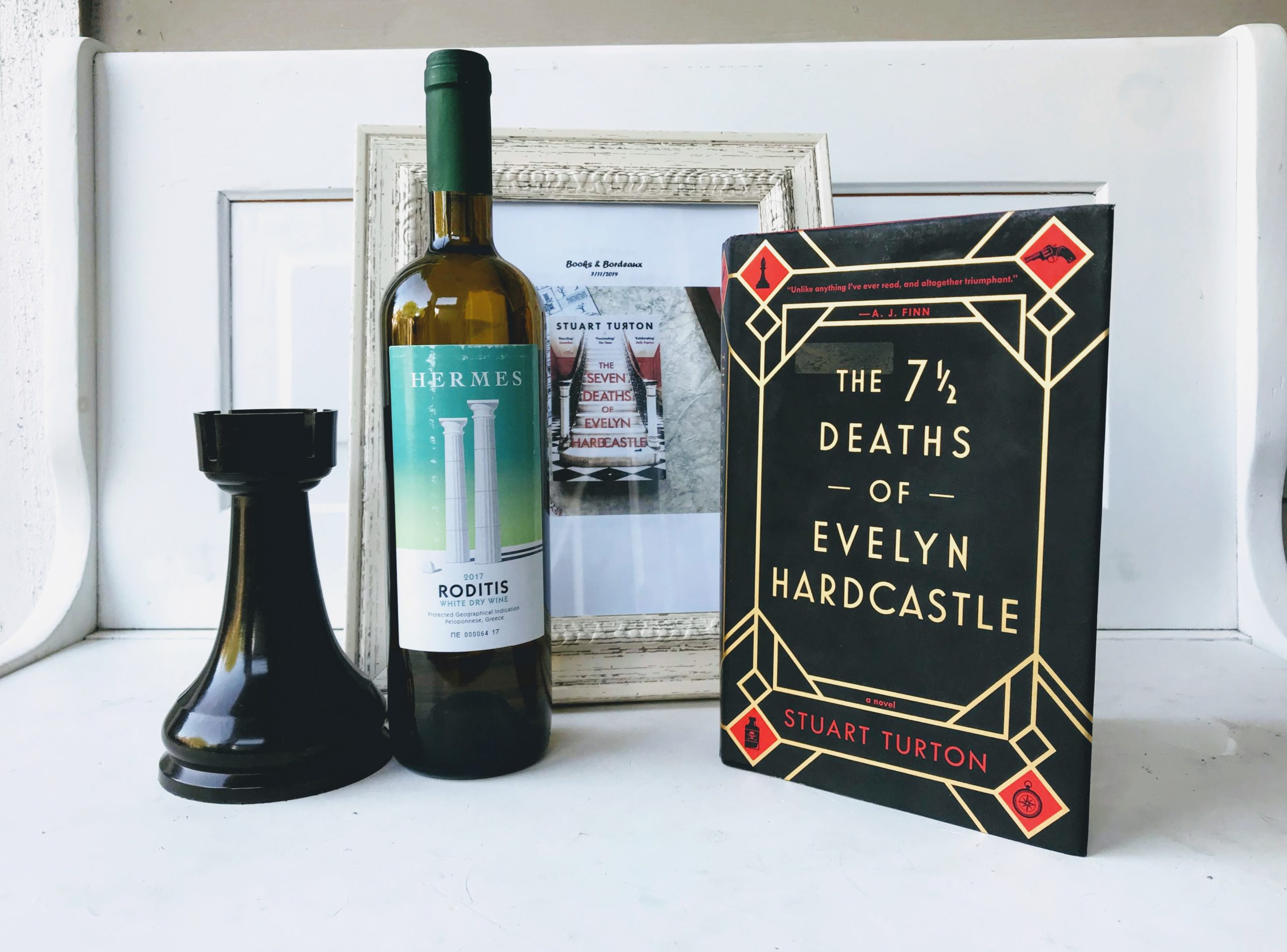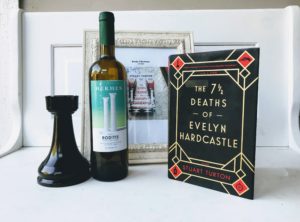Books & Bordeaux
Book Reviews, Discussion Guides, and Wine-Book Pairings
“Call no man happy until he is dead. Herodotus.” Mr. Nancy raised a white eyebrow, and he said, “I’m not dead yet, and, mostly because I’m not dead yet, I’m happy as a clamboy.” “The Herodotus thing. It doesn’t mean that the dead are happy,” said Shadow. “It means that you can’t judge the shape of someone’s life until it’s over and done.”
The 7 ½ Deaths of Evelyn Hardcastle: A Murder Mystery That Will Delight and Disturb

Nothing can prepare you for the intense ride that is The 7½ Deaths of Evelyn Hardcastle. You come for the Christie-esque mystery—you stay for the WTF…
The story begins with the protagonist’s journey to uncover his own identity. One by one we meet the inhabitants of the manor—the butler, the artist, the wealthy cousin. They each have a piece of the puzzle to share if only you can piece it together. When our protagonist finds he has a chance to prevent a murder, he must decide where place his trust. With an abundance of secrets, a ticking clock, and an honest-to-goodness masquerade ball, Evelyn Hardcastle is a uniquely entertaining mystery!
Jump to Evelyn Hardcastle discussion questions
I have to say how absolutely charmed I was by Evelyn Hardcastle. I found Turton’s prose luxurious and inviting. And his story-telling was brilliant—the mystery itself would have confounded a less organized writer, but Turton told the story in a way that was logical and engaging.
As a group, we were all impressed by the simultaneous complexity and clarity of the mystery. There were times a few of us felt the story dragged in the middle. We also had a bit of a debate, as some felt the depiction of Cecil Ravencourt’s obesity may have crossed over from reasonable to shaming, but some of us thought it was a considered and unexpected way to constrain a character. We agreed that Evelyn Hardcastle would make a great movie or mini-series.
Wine Selection & Tasting Notes
Hermes Roditis 2017. On the nose: mineral, brine, grass, lemon
On the tongue: The texture is just slightly creamy. You can taste lemon, sweetness, and cut grass. Lemon cream pie aftertaste is brief and delightful. Serve very cold. Flavors diminish in warmth.
The label image drove this selection, as with most of these wine/book pairings. I thought the two lone columns mirrored the isolation of Aiden and Anna, alone but together in Blackheath.

Spoilers Ahead…
Now for the big reveals, so only read on if you’ve read the book. Really, I mean it!
The True Nature of Blackheath
When the true nature of Blackheath is revealed, it feels like a sucker-punch, because you realize the entire time you were having fun waiting for the next blood-letting, all around was a digital prison of punishment (or ostensibly—recuperation). Oh—and the protagonist’s horribly painful backstory sneaks up from behind as well. You have to live with the sucker-punch though, because it’s also the glorious twist that perfectly explains the bizarre premise upon which we begin the novel.
Turton’s concept of a mental or digital prison is intriguing and a little scary because it is an achievable technology. Would you want a mental prison if it could be achieved? Could you ever trust it? As Turton succinctly sums up “Would you trust your government with it?” Even if our government was super-duper responsible with their mental prison, what if they got hacked? I think Richard K. Morgan showed us the darkest depths of a mental prison in Altered Carbon… The only way I could ever trust a mental prison is if I was running it. Prisoners are abused today, just behind cell walls. Can you imagine how much worse it could get in a digital world?
Evelyn Hardcastle asks us many questions about the nature of crime and punishment, rehabilitation and forgiveness. When you find out that Blackheath is a prison, it is reasonable to ask if it is recuperative. With its repeated physical and mental punishment, it is reasonable to ask if it is moral. Aiden asked to be put in Blackheath for a reason, but at the point we enter the story, he has no memory of his identity. What corrections officer continues to imprison and torture a person who has no memory of why he is there in the first place and who has committed no crime? What is the moral or logical justification?
With the character Annabelle Caulker, Turton goes a step further—What is the moral or logical justification for imprisoning and torturing someone who has no memory of why she is there and who has committed a crime?
The Plague Doctor claimed Blackheath was meant to rehabilitate us, but bars can’t build better men and misery can only break what goodness remains. This place pinches out the hope in people, and without that hope, what use is love or compassion or kindness? Whatever the intention behind its creation, Blackheath speaks to the monster in us, and I have no intention of indulging mine any longer. It’s had free rein long enough.
An Immersive VR Experience…For Good?
Consider the opposite side of the concept of Blackheath. You could construct a digital world that was not punitive at all, but only to run through scenarios meant to change a specific trait or mindset that was socially harmful in an individual. For example, using an immersive digital world, you could theoretically help someone who harbored racist sentiments to see things from a new point of view. Indeed, there is already proof of this concept in several research centers, including at Stanford University’s Virtual Human Interaction Lab (VHIL):
At Stanford’s VHIL, [Elise Ogle] helped create the experimental first-person content ‘Becoming Homeless’. Put on a VR headset and this content transports a user to ‘live’ the experience of losing a job, a flat, and go to living on the streets and feeling vulnerable – even experiencing gut fear as a threatening figure looms on a night bus.
Or imagine feeling what it’s like to meet racism face to face – this is another immersive-reality project from Columbia University developed with Stanford’s VHIL. ‘1,000 Cut Journey’ allows the viewer to become a black man, encountering the realities of prejudice as a child, adolescent and young adult – an emotional and disturbing experience.
“People have been touched,” says Professor Courtney Cogburn, who showcased her content at Tribeca Film Festival in 2018. “They’ve expressed learning something new about racism. We’ve tried to capture subtleties that not everyone picks up as well as the more in-your-face stuff.”
Empathetic Technology: Experiencing life though the looking glass

Stuart Turton’s Next Project, Perfect Work Space, and Recommended Read
This charming interview with the Los Angeles Public Library reveals insights into Turton’s life. You’ll learn that he’s already living his perfect life, working in the same space as his wife and raising his young daughter, that he’s been wanting to write a novel like Evelyn Hardcastle since he was eight years old, and—the best news—he’s currently working on a second novel!
UPDATE: Turton’s new novel will be available October 2020 and is titled The Devil and the Dark Water. He’s got the best titles, right?
As a side note, Turton’s review of The God of Small Things by Arundhati Roy, was so extravagant and gushing—he says “I genuinely believe every page is perfect”—I am compelled to read it to see if it lives up to expectations!
Selected Quotes
I have so many favorite quotes from Evelyn Hardcastle. Here are a few…
Seeing me, he grins broadly, the boy in the man appearing as if through a window.
How lost do you have to be to let the devil lead you home? This lost, I decide. Precisely this lost.
Yet instead of being angry, he pities me. That’s the worst part. Anger’s solid; it has weight. You can beat your fists against it. Pity’s a fog to become lost within.
“You’ve made my condition into a gift,” I say, feeling my spirits lift. “Well, what else would you call a second chance?” she asks. “You don’t like the man you were. Very well. Be somebody else. There’s nothing stopping you, not anymore. As I said, I envy you. The rest of us are stuck with our mistakes.
Evelyn Hardcastle Discussion Questions
- Coming soon!